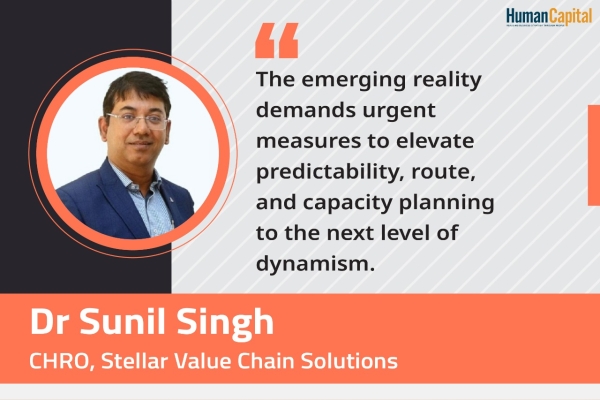
Why you should Integrate your HRMS with your Background Screening Processes?
- By Sunaina Meena |
- Apr 07 2022
No matter how big or small, every company needs a team dedicated to looking after each and every employee. Human Resource Management (HRM) refers to the department in charge of personnel management , and the HRM team is dedicated to identifying and managing human resources in the most efficient and productive manner for an organization.
With the development and implementation of new technology across workplaces, HR has had to step up on the tech front.When automation is a standard expectation, manual operations prove to be tedious and burdensome.
As a result, several firms have implemented a Human Resource Management System (HRMS) system to lighten the load on the HR function. Every new-age HRMS comes equipped with features that make HR and employees' jobs easier.
What role does an HRMS play in background checks?
As we all know, doing background checks can take a long time. But with new tools for background verification and screening HR can be relieved of a lot of the mechanical work. Verifying employment records, address proofs, and any criminal accusations can all be done in minutes with a the right algorithms in place.
HRMS powered with Artificial intelligence (AI) and Machine Learning (ML) technologies have redefined background screenings. The advanced algorithms used by these technologies can scour a much larger dataset for links that can be used to piece together a coherent background report from sources all over the country and the world.
Machine learning (ML) helps the system "learn" as new information is absorbed, and AI can spot trends and patterns. The algorithms can then take this massive amount of data, insert it into pre-defined data points, and then generate reports that are simple to read and comprehend.
People-oriented research has nearly vanished from the background screening process, leaving humans free to decide how information should be structured and used rather than sifting through countless databases in search of answers.
There are numerous benefits to incorporating a tech-enabled HRMS for all businesses. Here's how an HRMS can help with background checks at any workplace:
1) Rapid Data Accessibility: Large volumes of data can be analyzed in a matter of minutes using an AI (Artificial Intelligence) powered HRMS. When you type a person's name into a search engine, all matches to that name from databases all over the internet appear in seconds. More finely tuned algorithms can further streamline search results and provide you with results that fit many criteria. Imagine what can be done with search engines created specifically for background verification if a simple Google search can lead you to a person's Facebook, Twitter, LinkedIn, and Instagram profile.
2) Smarter Data Analysis: By combining AI and machine learning, background screening by an HRMS can now be taken to a new level by selecting data based on relevance. It is no longer sufficient to obtain all of a person's information from the internet. No one has time to sort through which data is relevant to a background check and which isn't, and new technology can evaluate and present only useful information to recruiters, such as residence verification, criminal records, and previous employment verification.
3) Risk and threat analysis: One of the primary goals of a background check is to ensure that you are selecting a trustworthy individual. HRMS is equipped with technology that can recognize phrases such as "termination of employment" and collect all pertinent data. A search result like this makes it much easier for HR to figure out why someone left/was dismissed from their previous job and whether they are trustworthy enough to hire for the new position. If an employee was fired on suspicion of embezzling funds but the charge was never proven and no police report was filed, it will not appear on their criminal records. This gap can be filled by using machine learning (ML) algorithms to analyze risks and hazards.
4) Automatic Scoring: When doing a background check, an AI-powered HRMS can create a score for the candidate swiftly and efficiently by taking into account certain critical performance characteristics. The software can offer the applicant a better score based on the company’s background screening policy that could include previous performances, employment history, mentions of awards, accolades, or published papers. On the other hand, providing misleading information or discrepancies in previous records might significantly lower a candidate's score.
5) Continuous Monitoring that keeps you informed about Your Employees: After an employee has been confirmed , background screening technologies can help you achieve the next stage in the company’s screening policy. Post-hire monitoring is no longer a "nice to have," but rather a need for many businesses. For example, healthcare businesses must check on a regular basis to see if any of their staff have been barred from working in the industry by a government agency. These businesses must also ensure that employee licenses are valid and unaffected by disciplinary action.
By regularly verifying official exclusion and debarment lists, workforce monitoring technology automates the process of validating employees' continued job eligibility. An HRMS can also automatically send a notification whenever information needs to be reviewed further. Thus, an HRMS makes it feasible to keep fully aware of people in your organization who are no longer eligible for work and those who require a review of their license or other credentials by using always-on continuous monitoring technology.
Now, let us have a look at some of the broader concerns that an effective HRMS can address in your organization. Some of the key benefits of implementing an HRMS are:
1) Employee Self-Management during Onboarding
An onboarding process allows a candidate to learn everything there is to know about a company, including its targets, goals, work schedule, culture, and so on. By helping out with the onboarding process, a good HRMS can ensure that a candidate's interaction with a business is meaningwell, as well as long-lasting and beneficial. It can assist new hires in recognizing their goals and duties in relation to the organization, providing a solid foundation that they can continue to build on throughout the years.
Every key document required by a candidate can be uploaded directly by the candidate, making the onboarding process simple for the candidate. And by having all the relevant documents in one place, it allows the HR team to have a simpler review process as well!
2) One Unified Platform
Every employee in an organization can express their opinions and ideas on a common platform provided by any modern HRMS, thus facilitating a shared space that encourages a sense of community. Employee engagement can also be greatly increased by using surveys and group activities. If necessary, an HRMS can also provide online training for new hires or a specific team within an enterprise, and it can boost employee morale and engagement through these activities.
3) Transparency
Visibility into an organization and what they stand for makes for an unforgettable employee experience, and this is one that an HRMS can facilitate. It guarantees that every employee in an organization understands their background screening policy, leave policy, rewards and recognition policies, as well as any other policies of the firm as a whole. HR can quickly add all employee-related information to the dashboard, such as their leave balance, holiday calendar, performance graphs, and so on.
.
All an employee has to do is log into the portal, and all of the data is at their fingertips. In addition to this, the HR function stands to benefit as well, because they can see all employee-related data, such as work schedules, skill sets, leave applications, and so on, all in one place.
Conclusion:
There is no doubt about the fact that integrating your HRMS with your background screening processes is necessary. A modern HRMS is a necessary tool for any organization which allows for efficient background screening of an individual.Thus, it delivers quick results with little human effort as per the company’s background screening policy.
Are you comfortable working with dispersed colleagues?
Trending
-
SBI General Insurance Launches Digital Health Campaign
-
CredR Rolls Out 'Life Happens' Leave For Its Employees
-
Meesho Announces 30-Week Gender-Neutral Parental Leave Policy
-
Microsoft Unveils Tech Resilience Curriculum To Foster An Inclusive Future
-
60% Indian Professionals Looking For Job Change Due To COVID: Survey
-
SpringPeople And Siemens Collaborate For Digital Transformation Push
-
86% Professionals Believe Hybrid Work Is Essential For Work Life Balance: Report
-
Almost 1 In Every 3 People's Personal Life Affected Due To Work Stress
-
Meesho Rolls Out Reset And Recharge Policy For Employees
-
80% Of Talent Leaders & Academics Say Pandemic Changed Skill Needs For Youth: Report
-
Hero Electric Rolls Out 'Hero Care' Program For Employees
-
Human Capital In Collaboration With ASSOCHAM Hosts Virtual Conference
-
IKEA India, Tata STRIVE Collaborate To Create Employability And Entrepreneurship Opportunities
-
SAP India, Microsoft Launch Tech Skilling Program for Young Women
-
DXC Technology, NASSCOM Collaborate For Employability Skills Program
-
Lenskart To Hire Over 2000 Employees Across India By 2022
-
Mindtree Launches Learn-and-Earn Program
-
Tata AIA Extends 'Raksha Ka Teeka' To Its Employees
-
Swadesh Behera Is The New CPO Of Titan
-
NetConnect Global Plans To Recruit 5000 Tech Professionals In India
-
Hubhopper Plans To Hire 60% Of Indian Podcasters By 2022
-
Corporate India Needs More Women In Leadership Roles: Report
-
Aon to Invest $30 Million and Create 10,000 Apprenticeships by 2030
-
Tech Mahindra Launches ‘Gift a Career’ Initiative for Upskilling of Youth
-
40% Women Prefer Flexible Working Options in Post-COVID World: Survey
-
3 out of 4 companies believe they can effectively hire employees virtually: Report
-
Vodafone , CGI and NASSCOM Foundation launch digital skills platform
-
Odisha: Bank, postal employees to deliver cash for elderly, differently-abled persons
-
Skill India launches AI-based digital platform for "Skilled Workforce"
-
Hiring activity declines 6.73% in first quarter: Survey
-
70% startups impacted by COVID-19 pandemic
-
Bajaj Allianz Life ropes in Santanu Banerjee as CHRO
-
Over 70 Percent MSMEs look at cutting jobs to sustain businesses
-
93 Per Cent employees stressed about returning to office post-lockdown
-
Johnson & Johnson India announces family benefits for same gender partners
-
Indian firms turning friendly towards working mothers
-
Welspun India names Rajendra Mehta as new CHRO
-
Wipro partners with NASSCOM to launch Future Skills platform



Human Capital is niche media organisation for HR and Corporate. Our aim is to create an outstanding user experience for all our clients, readers, employers and employees through inspiring, industry-leading content pieces in the form of case studies, analysis, expert reports, authored articles and blogs. We cover topics such as talent acquisition, learning and development, diversity and inclusion, leadership, compensation, recruitment and many more.
Subscribe Now











































Comment